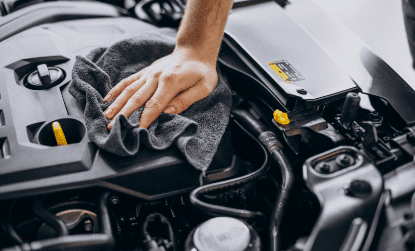MythBusters once compared a clean car and a dirty car to test which one had better mileage. The experiment initially suggested that a layer of dirt would give the car a “golf ball-like effect” for improved aerodynamics and subsequently improved fuel efficiency. This was proven wrong.
A clean car gets better gas mileage than a dirty car, producing less drag overall, which technically leads to better fuel efficiency. Better fuel efficiency means savings—$4,175 over a period of 5 years for a 30mpg vehicle, according to Fuel Economy.
What that established, how do you clean your car to get that improved mileage?
Here are six ways how:
1. Wash and wax regularly.
Not sure when your car is due for another wash? Go ahead—wash and wax it. Chances are it’s been days since it was last washed anyway, if you’re wondering when to wash it again. At the very least, you’ll get rid of any contaminants that have stuck to your car, especially if you’ve been out a lot, or if it’s been raining.
For a quicker but no less effective clean, wash the dirt off with a small electric pressure washer using foam guns.
2. Use quality cleaning/washing tools.
Top-quality tools, like a wash mitt made from a gentle but durable blend of wool, polyester, and nylon that holds more soap and water, will not only lessen the amount of soap bucket dipping you need to do, they will also help ensure that your body paint is not damaged.
If your car is dipped or has a matte finish, use a washcloth that’s non-abrasive and counteracts mildew.
3. Clean under the hood.
This is non-negotiable if you’re after better mileage. In particular, clean your engine bay and change your air filter.
A dirty engine bay gives you a less fuel-efficient vehicle. That’s because debris can build up, making the engine run hotter and causing your vehicle to burn more fuel. The good news? You can easily clean the plastic engine covers that can look very filthy and hopeless.
While cleaning your engine bay won’t affect mpg, it can address the problem of having leaves and other debris under the hood that would make it hard for air to reach the engine.
Speaking of air, airflow to your engine is vital for maximum efficiency. This is why you need to change your air filter regularly. An old or clogged filter can cause engines to work harder and burn more fuel.
4. Make sure your tires are properly inflated.
With properly inflated tires, your fuel economy can increase 0.6% on average and as much as 3%. On the other hand, under-inflated tires can lower your gas mileage by about 0.2% for every 1 psi drop in the average pressure of all tires.
You can’t miss out on this opportunity for better mileage since maintaining tire pressure is so easy to do.
5. Keep your tires clean.
Mud and stuck-on dirt can compromise fuel economy. If you’ve been driving in the rain or in the mud, be sure to clean your tires at once to ensure good traction, which is one of the factors in improving fuel economy.
6. Use oil with lower viscosity.
Take the word of automotive manufacturers and choose oils that they recommend. A lower-viscosity oil used with a premium synthetic oil can slightly increase your gas mileage, as these oils flow easier through the oil pump and the engine. That means less drag and better lubrication.
Better gas mileage results in great savings, and there are easy ways to improve your car’s gas mileage. Be sure to follow these hacks.
For more great savings opportunities, especially when it comes to necessary repairs, some of our products may suit your needs. Check them out today, especially if your manufacturer’s warranty is running out soon.

